Procol HarumBeyond
|
|
|
PH on stage | PH on record | PH in print | BtP features | What's new | Interact with BtP | For sale | Site search | Home |
|
Procol Harum at The Royal Festival Hall, 3 March 2017
The Thirty-Ninth Step • George Lovell
We all keep a tally of some sort – an anniversary, a birthday – whether acutely aware of it or doing our resolute best to ignore it. Numbers related to a tally often have an inherent cabal, their import personal, not easily shared or subscribed to. When word reached me that Procol Harum would play a concert in London at the Royal Festival Hall to mark fifty years of music-making, a jubilee few rock groups approximate let alone attain, my first reaction was to contrive to be there. Felicitously, demands of work could be improvised to allow me to attend the performance, which would feature not only the band itself but an orchestra and choir. The prospect was further enhanced by the likelihood of hearing new songs from a forthcoming album, Procol Harum’s thirteenth, called Novum. Thirteen in many countries and cultures is considered unlucky, an omen of misfortune; not so in Italy, as fellow aficionados Antonio, Jack, or Stefano will tell you, or among the Maya peoples of Mesoamerica whom I research, live among, and write about. Surely a 'new thing' – the meaning of 'novum' in Latin, Google informs me – would for Procol Harum also be a 'good thing', and so too for fans like me making their way to London to hear them.
The concert marked the thirty-ninth occasion that Procol Harum, pioneers not only of so-called progressive rock but symphonic rock as well, was to play alongside an orchestra. As I tallied up the number of times I have heard Procol Harum perform live, it turned out that the gig at the Royal Festival Hall was to be my thirty-ninth too. Growing up in Glasgow, in need of company and a maze to unwind, besides grappling with the lyrics of that eponymous first album among my best loved pieces of literature was John Buchan’s 'shocker', the Scots novelist’s own term for The Thirty-Nine Steps (1915). Alfred Hitchcock adapted the book in 1935 for one of his most famous films, a favourite of my mother’s. A movie addict, she was as good-looking a gal as Robert Donat, who plays the intrepid Richard Hannay, was a guy; I imagine it to have been, age-difference notwithstanding, love at first cinematic sight. With such resonant harbingers, how could my very own thirty-ninth step, an outing to hear Procol Harum one more time, be anything but historic?
The Lead Up
In my line of work – I am a historical geographer consumed by what took
place in Latin America during colonial times – I have been fortunate
throughout my career to combine business with pleasure. The date of the
concert – 3 March 2017 – fell during a period when I was on sabbatical
leave in Seville, working on a book (like Procol Harum, I have thirteen
titles to my name) about the conquistador Pedro de Alvarado (1485–1541). He
is the subject of my most recent endeavour, published in Spanish as
Atemorizar la tierra: Pedro de Alvarado y la conquista de Guatemala,
1520–1541 (Figure 1).
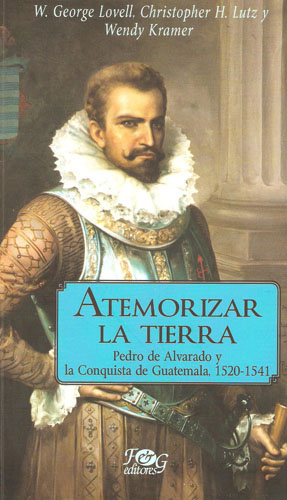 |
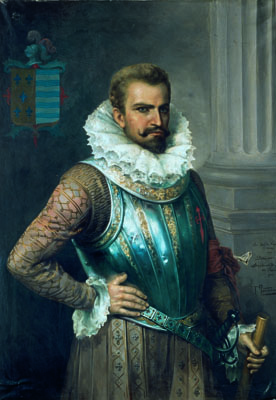 |
| Figure 1 | Figure 2 |
One of my sabbatical projects is to create from that Spanish-language edition an English-language equivalent – Strike Fear in the Land: Pedro de Alvarado and the Conquest of Guatemala, 1520–1541. The cover for Atemorizar la tierra, a reproduction of a painting housed in Seville’s Archive of the Indies, portrays the emblematic conquistador of one of Procol Harum’s most popular songs in halo-browed splendour – not, though, with sword held high but hanging instead to the left of his armour-plated breast (Figure 2). That jewel-encrusted blade came down with a tortuous blow on the Maya Indians who resisted Alvarado’s invasion force. The appetite of the triumphant victor for bright shiny gold was insatiable, his exploits across the Spanish Main, where he sailed for parts unknown to man, a veritable Pandora’s Box.
'Some people say that Pedro de Alvarado made war out of greed,' wrote his fellow conquistador and chronicler Bernal Díaz del Castillo. 'I do not believe that: I think he struck to fill all with fear.' Even his brothers and closest friends chose to exit the play when Don Pedro was front stage centre, keeping a safe distance between themselves and outbursts of his psychotic behaviour, his wrath notorious even by the standards (and bugles) of the day.
Some Alvarado-related materials at the library of the Royal Geographical
Society in London meant that I could log up some research time the day
before the concert. I planned my trip accordingly, leaving the sparkle of
Seville, where orange blossoms had begun to scent up the night air, and
arriving in the Big Smoke on an evening that was cold, dark, rainy, and
forlorn. Despite the fallen gloom, post-Brexit, of what had once been 'An
Old English Dream' – on a wall in Camden Town, the London street artist,
Bambi, riffing off Hollywood romance La-La Land, depicts UK Prime
Minister Theresa May dancing with US President Donald Trump as Lie-Lie
Land
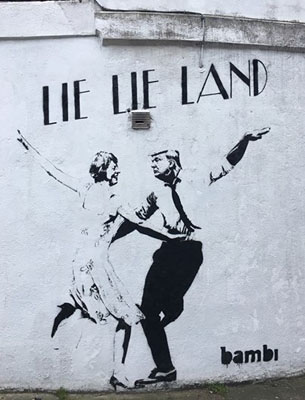 (Figure 3) – the lure of the music to come cheered me up.
(Figure 3) – the lure of the music to come cheered me up.
The Day Before
My London base in Chelsea lies just off the King’s Road, along which Gary
Brooker recalls walking one New Year’s Eve with his
Swiss
(then) girlfriend
Françoise (now wife Franky). The strains of A Whiter Shade of Pale caught
their attention, and they traced them to a parked Rolls Royce. Inside the
glamorous vehicle sat John Lennon, bottle of champagne at the ready. The
door of his 'lovely roller' swung open. “Gary, get in. Have a drink!” The
year of Sgt. Pepper, by all accounts, was seen out in style. Quite an odd
occurrence now, Gary admits, but back in 1967, quite normal. On a cold and
windy morning, it was hot coffee that sustained me on my brisk transit of
the King’s Road and then up to Kensington. As closing time in the RGS
reading room drew near, I returned to the front desk the rare editions I was
consulting and struck off to the nearby Victoria and Albert Museum, where
notice of a timely exhibit had piqued my curiosity on the walk up.
“You say you want a revolution?” Lennon inquires on The Beatles’ White Album, the entire contents of which I once heard covered at a club called Boris in Buenos Aires by Nube 9 (Cloud 9), a five-member band (one women, four men) who know how to shake things up, if not foment an uprising. Lennon’s tongue-in-cheek query frames the V&A exhibit. The venerable institution engages the question in multiple forms of accessory media. One is a lavish catalogue, Records and Rebels, 1966–1970. Another is a compendium of hit songs from the era, re-mastered and re-released on resurrected vinyl as well as compact disc. On the CD compilation A Whiter Shade of Pale assumes a rightful place of honour, track 4 on disc 2, preceded by Cream’s Strange Brew and followed by Nights in White Satin, the Moody Blues’ classic. Leafing through the catalogue, an ideal complement for coffee tables everywhere, I noticed four separate entries for Procol Harum and two of its album covers. The sleeve of the first album, elegance in black and white, is among those selected for AD 1967; Shine on Brightly is a chosen feature for AD 1968. Oddly enough, I thought, given London’s fame as the beating heart of the Swinging Sixties, in the case of the latter it is not the cover art of the UK sleeve but its North American counterpart that is represented. Iconography matters, I contend: contemplating Buddha, a signpost, a Prussian-blue electric clock, and a chandelier in full swing makes more visual sense to me, given the lyrics of the second album’s title track, than wondering what a submerged piano and a sinister-looking mannequin propped against it is about. I found myself rambling on to another V&A exhibit, 'Undressed: A Brief History of Underwear'. No sinister-looking mannequins there, just skimpily attired ones, all rather risqué. 'The lingerie show that will take your breath away,' declared Anna Murphy in The Times. 'Hold tight!' Only in England, I conceded, discreetly making sure my own underclothes were intact, not torn from any Batman wannabe exertions, to say nothing of broken bones.
The Day Of
I had planned to walk from Chelsea to the Royal Festival Hall but the friend
I was staying with nixed the idea in view of the inclement weather. “Take
the number 211 'bus at Sloane Square,” Krystyna recommended. “It will take you
right to Waterloo. The Royal Festival Hall’s a hop, skip, and a jump away.
You’ll have plenty of time before the concert starts, and won’t arrive
soaked. Treat yourself to dim sum at Ping Pong. If the weather clears, go
for a stroll along the South Bank. Good views from there across to the City.”
I did as she suggested after refreshing myself at The Chelsea Potter, a groovy pub that Time Out claims (in its day) was the local of regulars The Rolling Stones (Figure 4). The 'bus ride took me along the border of well-heeled Belgravia and Pimlico, affording up-close vistas of Westminster Abbey, Big Ben, and the Houses of Parliament before we crossed the Thames over the bridge that would be the scene of mayhem three weeks later. The London Eye was as conspicuous a landmark to head for at journey’s end as the Royal Festival Hall (Figure 5), adjacent to which tea and dim sum at Ping Pong was indeed as delicious as Krystyna said it would be. Late in the afternoon the weather improved a bit, so along the embankment I wandered, wondering who would be the first Procol Harum associate I would bump into.
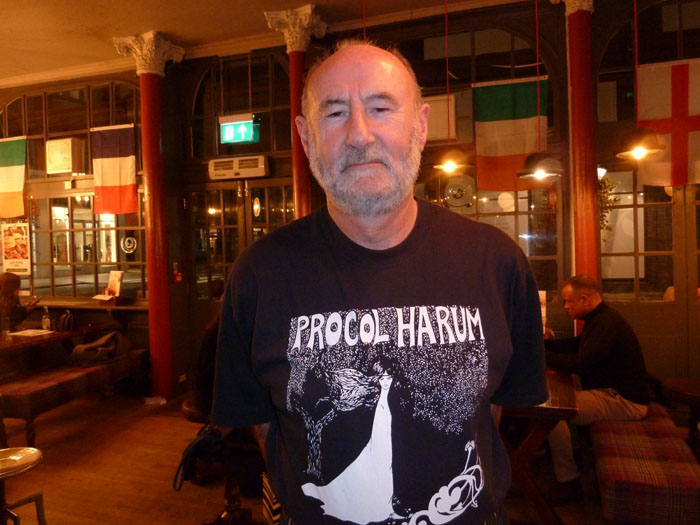 |
 |
| Figure 4 | Figure 5 |
 |
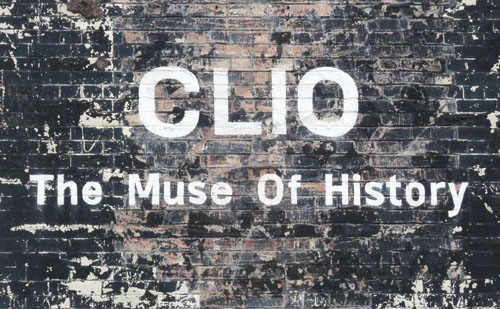 |
| Figure 6 | Figure 7 |
“Hullo there, George!” a familiar voice cried. “Well, fancy meeting you here!” With a big grin, fellow Scot Charlie Allison extended his hand for a hearty shake before introducing me to his wife, Elspeth, and two of their friends, Sarah and Graeme. Elspeth had accompanied Charlie to hear Procol Harum in the 1970s, but tonight would be a first for Sarah and Graeme. Fond of one-upping me on the matter, Charlie pointed out to the assembly that his inaugural Procol Harum outing took place one night before mine did – 1 October 1970, to be precise, at the Caird Hall in Dundee.
“How many is this now for you, George?” Charlie turned to his companions before I could answer. “This man’s a professor who’s actually written a book about going to Procol Harum concerts. The Waiter Brought a Tray – very individual, a kind of memoir. Time for another, no?” Thirty-nine, I responded, alluding to John Buchan in the knowledge that Charlie would appreciate what I was getting at. And yes – Another Drink will be served. Charlie and his guests headed west along the riverside. I made off to the east, towards the refurbished OXO building (Figure 6), behind which graffiti artistes had been strutting their stuff on a huge brick façade. One of their creations declared “CLIO: The Muse of History” (Figure 7), causing me to conjure up a youthful liaison nailed by the words to Toujours l’Amour. That knotted cord, it’s still there.
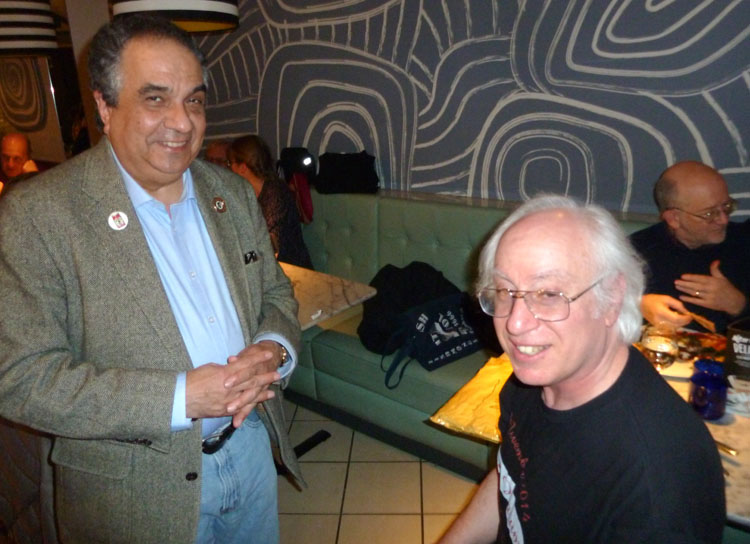 |
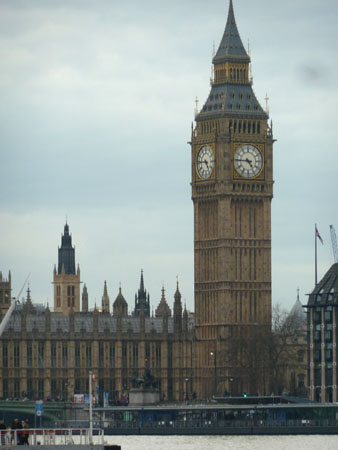 |
| Figure 8 | Figure 10 |
The Evening Of
The challenges of hosting a BtP gala fan gathering, at which permutations of the
Palers’ Band (besides socialising and making merry) pay tribute to the
mastery of their mentors by covering their songs, proved too tricky to mount
on this occasion. Arrangements were made, though, that would see a far-flung
assortment convene before and after the main event, augmenting established
bonds and fostering nascent ones, new lamps for old. There were familiar
faces aplenty at the Pizza Express, though sadly, too, some who (now in the
company of legendary Procol drummer BJ Wilson) 'look down from above,'
Gary’s affective way of putting it, of bringing Home the bacon, when
introducing A Salty Dog. Our intrepid BtP webmasters Jens and Roland
welcomed us warmly. I greeted New York stalwarts, Tito and Marvin (Figure
8), but missed the presence of another two buddies from the Big Apple,
Evan and Unsteady Freddie. Over in a back corner I dined with Jeff Levine,
who’d flown in from Florida, and Allen 'One-Eye'
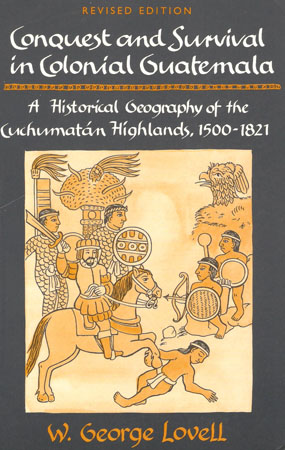 Edelist, who’d come over
from California. Frans Steensma, from the Netherlands, joined us. Jeff leaned
over and asked me, “Is that Elizabeth Bryson I see?” You got it, Jeff – like
you, another visitor from across the Pond. I spot my 'Barnyard Brother',
Henrik Gottrup, there with his wife Helle from Denmark, and my dear
soulmate, Hans Tammes, a Dutch dynamo, and hug all three. To a beautiful brace
from Barcelona, Carmen and Martín, I gift a copy of Atemorizar la tierra,
its conquistador cover getting their thumbs up. An exchange with Paul
Holland had us both laughing uproariously, remembering a backstage retort of
Gary’s in Berkeley in 1996, when I handed him a copy of my first book,
Conquest and Survival in Colonial Guatemala,
(Figure
9)
which (ever the jester) he
construed to be a cook book.
Edelist, who’d come over
from California. Frans Steensma, from the Netherlands, joined us. Jeff leaned
over and asked me, “Is that Elizabeth Bryson I see?” You got it, Jeff – like
you, another visitor from across the Pond. I spot my 'Barnyard Brother',
Henrik Gottrup, there with his wife Helle from Denmark, and my dear
soulmate, Hans Tammes, a Dutch dynamo, and hug all three. To a beautiful brace
from Barcelona, Carmen and Martín, I gift a copy of Atemorizar la tierra,
its conquistador cover getting their thumbs up. An exchange with Paul
Holland had us both laughing uproariously, remembering a backstage retort of
Gary’s in Berkeley in 1996, when I handed him a copy of my first book,
Conquest and Survival in Colonial Guatemala,
(Figure
9)
which (ever the jester) he
construed to be a cook book.
The hour we were waiting for, however, drew nigh: no town-clock reminders (Figure 10) were necessary. Off to the concert, honorary members of the Homburg Society one and all, we dutifully fled.
Half a Century, Part One
The thronged foyer of Royal Festival Hall that night, it
being a sold-out event (Figure 11), took a bit of negotiating. Next
to a display of merchandise offering, among other concert keepsakes, a
Souvenir of London T-shirt, I got to speak with Diane Rolph and had a brief
exchange with Geoff Whitehorn’s wife, Annie. “Remember what they say about
rehearsals, George,” she remarked. I mulled over her words as I made my way
upstairs. Noticing me tossed and crossed and screwed in transit after I’d
ascended several flights, Franky Brooker came to my rescue.
“Show me your ticket.” Pause as Franky examined it. “Your seat’s over on the other side.” Something else, Franky is. I went where she pointed, and settled in.
At ten past eight, members of The Senbla Concert Orchestra filed onstage,
followed by The English Chamber Choir. David Firman, a veteran conductor of
some twenty collaborations with Procol Harum, entered next. Then came the
band, for whom a rather hapless compère (not at all well briefed or
prepared, he had to be shown how to operate the microphone) solicited from
the crowd 'rapturous applause'. This came, as best I could tell, not before
but after Shine on Brightly started the proceedings, no choir but melodic
orchestration complementing Geoff Whitehorn’s crisp guitar and the sumptuous
organ of Josh Phillips, with Geoff Dunn’s drums and Matt Pegg’s bass keeping
everyone on course. That calibrated balance, at least to my ears, was missing
on Homburg, especially on the second verse, when the choir competed
excessively with Gary’s vocals. A pity, for the Commander himself was in
full-throated voice.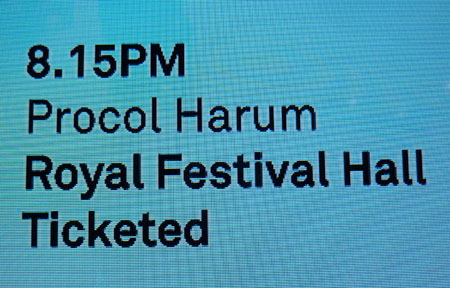
“‘How do you warm up?’ I get asked.” Sharing with us the same tonic he had divulged previously to a BBC interviewer, he revealed: “Two glasses of red wine, which relaxes the vocal chords. And the Swiss mints Ricola – keeps everything lubricated.” Thereafter “I just have to remember the words.” He had no trouble recalling them during the next song, looking nostalgically “back in the days” when nights were spent at one Grand Hotel or another during Ritzy tours. His piano playing was exquisite, a violin solo half-way through too. That French girl, yet again, offered to teach Gary to dance, not give him a chance, as the bittersweet tale of Toujours l’Amour was recounted, Geoff’s guitar and Josh’s organ again in audible synch with choir and orchestra. Everyone acquitted themselves superbly on Symphathy for the Hard of Hearing, which, Gary observed, “We don’t get to play much, save for when we’re with an orchestra and choir.” His moving tribute to a neighbour’s experiences of war was enthusiastically received.
“Everyone feeling alright?” Pitching the question twice triggered a back and forth between Gary and Gordon Chalmers, one of the Tobermory Twosome. The latter’s Scottish accent prompted Gary to spin a yarn about a gig in Glasgow, at which an outspoken member of the audience repeatedly requested “Play A Whiter Shade of Pale!” When, finally, Procol Harum obliged, the miscreant’s response was “Play it again!” In the seaman’s log of concerts posted on the BtP website, I see no gig listed for Glasgow other than my inaugural outing at Green’s Playhouse on 2 October 1970. The band did play at the City Halls on the Ides of March in 1973, but any such banter escaped me at the two Glasgow gigs I attended. In the era of fake news, no need to allege falsehood for truth, but the Glaswegian in me would love to have the exchange alluded to verified by another source. That said, as Canadian writer Thomas King insists: “The truth about stories is that that’s who we are.” It’s the telling that matters most: if something might have happened, then it could have happened, so (somewhen or other) it did. Seasoned ranconteur and wordsmith that he is, Gary understands that perfectly.
A crackle in the sound system marred A Salty Dog, during which the choir’s singing again boomed over the top of Gary’s soulful vocals, though its Latin chants meshed nicely with the orchestration. The spell of In Held ’Twas in I for me was broken by its truncated rendering: we were not 'held close' after 'the darkness of the night' but instead 'through hoops [w]e skipped, high wires [w]e tripped' right to a Grand Finale that was stirring but somehow diminished by no autumnal madness nor soul searching.
“It wouldn’t be Procol Harum if there wasn’t something different,” Gary justified, and 'Quite rightly so' (not heard that in a while). “When did we last do an album?” he asked rhetorically, before volunteering “2003,” the year The Well’s on Fire was released. “Of all the albums I’ve made, this is one!” was how Novum was introduced. From it Neighbour got first nod. Gary took off his jacket, adjusted his braces, straightened his shoulders, and donned an accordion, the band-only offering (graced with Geoff Whitehorn’s dulcet harmonies) incorporating not one, not two, but three ukuleles, strummed and hummed to by Sam Brown with 'Bam and Wam' indeed very different, Gary!
“There will now be a short intermission,” he declared through thunderous applause. The interval, in fact, lasted the better part of an hour.
Royal Festival Fall
Where I was seated was not close to the stage, but nonetheless I had an
unobstructed view of the dimly-lit part of it Gary was about to leave for an
illuminated area behind a curtain, below and in front of him. The house
lights did not come up, nor did anyone appear to help usher safe passage
with a torch or flashlight, as in the old days when they led you to your
seat in the cinema after the film had begun. Who could have foreseen what
happened next? The opening of In Held ’Twas in I was calamitously
reprised. In the darkness of the night, Gary missed a very steep step,
stumbled, toppled, and fell flat on his face. Unlike Liquorice John, it was
no premeditated fall from grace. The thump he made upon impact with the
floor, well and truly descended, was ominously audible.
So, too, was the gasp of shock. A tsunami of concern followed, visceral and palpable. Diane, accompanied by her daughter and son-in-law, had a grandstand view of what happened from a section of the hall near mine. She signalled to me.
“Barrie Wilson’s sister is here. She’s a nurse. Go down and have them page her.” I did as instructed, reaching the site of the mishap with others equally distraught. Stefano was most anxious, Paul and his wife too, the latter neighbours and friends of Gary and Franky in their place of continental refuge in France. After inquiries, we were told that a doctor had already been summoned, that paging BJ’s sister would not be necessary. I relayed that back to Diane and headed to the bar.
There I bumped into Jonas Söderström. “I wonder if he’ll make it back on stage,” he pondered. Jonas shared the view I had, that the orchestra and choir tonight were not up to par with those we had heard, also under the baton of David Firman, at Ledreborg and Wuppertal. Had sufficient rehearsal time been allocated, he pondered further. I looked at my watch, the minutes ticking away solemnly. Then, from over the sound system, which had earlier announced a longer intermission than usual, came the news we had been waiting for – in truth hoping, if not praying for. “Ladies and gentlemen: please take your seats. Tonight’s performance is about to re-commence.”
Half a Century, Part Two
With the collective ensemble, band members included, more or less in situ at
10.20 pm, out hobbled our Commander-in-Chief, to a prolonged standing ovation.
He looked, not surprisingly, somewhat the worse for wear. A hat helped keep
in place a bandage on his forehead, and a dressing covered the bridge of his
nose. Acknowledgment was made of a hurt hand and a hurt head, but not of a
cracked rib also sustained in the tumble, diagnosed later. The school of
life that Gary attended, however, instilled in him (long before, I suspect,
they figured in his repertoire) the importance of two key words: 'soldier
on'. And 'shine on' too – which was precisely what he did.
Break or bust, the thin end of the wedge cuts both ways. Lose or win, we can’t give in, so nobody did. How, looking back, the second half of the show transpired to be better than the first, from the tiniest percussive tinkle to the most clamorous of choral SHALIMARS, is anyone’s guess, so good luck wandering through your playing cards, and trying to understand them. Gary was still at the helm, but another new song, I Told on You, had Geoff Whitehorn projecting his voice even more, with Josh (on account of the injuries to Gary’s hand) fingering some piano parts. When evoking 'Man with a Mission', any 'eye on the future' had to be heartened, I thought, by the two selections thus far from Novum. Captivating Whaling Stories were told in full, but again played with less piano participation on the composer’s part. A flute soared as daybreak washed, the crowd on its feet for a wake that was anything but peaceful. Gary peered off to his right, aware of someone negotiating a more successful entry onstage than his departure off it.
“A message from Her Majesty?” he quipped. Manager Chris Cooke, it turned out, was not there to deliver any royal missive but to whisper a reminder that Procol Harum play again in London, at Shepherd’s Bush, on May 13. After Gary made the pitch came a rousing Conquistador, Matt out front with Geoff Whitehorn, both vocally rollicking as Josh regally rocked. Gary at this juncture called for kudos for choir and conductor, dutifully hailed. Into the Flood followed, another number often held in reserve for orchestral occasion. The part in the middle, where the violins sound more like frenetic fiddles playing a jaunty jig, got hands clapping. From Josh’s keyboard climax came a cathartic Scottish drone, a lament worthy of MacCrimmon, if not McGreggor.
The highlight of the show came next. Ever since BtP alerted us to Novum in an extensive conversation with Gary, during which references to the track Sunday Morning intrigued me, I wondered what it would sound like. Targeted for release as a single, the song was played on BBC Radio 6 when Stuart Maconie hosted Gary in a broadcast that I’ve now listened to a dozen times. I concur with my darling Charlie, who also finds its impact arresting, and affecting. In the dialogue he had with webmaster Roland for the BtP scoop, Gary notes that some cuts on Novum lend themselves to orchestration, and so “could be expanded upon, or made more luxurious, if that’s the right word,” adding: “I’ll be doing that in a couple of weeks, actually.” The results were stunning. “Orchestrated by Josh on the Yamaha Montage on the record,” Roland observes, to soothing effect, the Sunday Morning to which we were treated as Friday evening wound down was even more haunting than its studio iteration, lush and nuanced, the night’s finest moment, Gary’s voice and Josh’s organ the cum laude of Novum’s third offering.
Band introductions were left to the end, Gary recognising the cohesion and
commitment, a decade plus in this incarnation of Procol Harum, of Josh,
Matt, and the two Geoffs, the senior of the pair in turn singling out the
remarkable creativity (and longevity) of “the most accident- prone man in
show business.” We were all invited to sing along to the most-played anthem
in popular music for the past fifty years, A Whiter Shade of Pale, our
participation elicited thus: “Have a go tonight.
Tomorrow we might all be dead.” Gary himself saw fit to speak rather than
sing “the room was humming harder” perhaps because, given the episode that
charged the intermission, for him it must have been. And so it was, later –
later than anyone could have imagined – that we retired to Bar Topolski (Figure
12) for post-concert revelry.
for post-concert revelry.
The Mirror, On Reflection
Beneath the railway line that ran directly overhead, the quietest and most
secluded of Topolski’s three cavernous arches had been reserved by BtP for a
post-concert party that had promised to be a full house, and then some.
Problem was, Gary’s tumble had put an hour or more on to when festivities
were supposed to start. This meant, alas, no-shows galore, which (despite
Roland’s conciliatory explanations) did not appease Topolski’s staff, as
they signalled a significant dent in the hip bar’s Friday-night takings,
tips most of all. By the time I arrived, the 'invite-only' space earmarked
for BtP had been opened up to passing trade, the illusion of its being more
than it actually was imparted by the strategic placement of wall-to-wall
mirrors, their reflection ingenuous. Furthermore, in order to entice
ordinary customers, and not cater merely to a winnowed number of Procol
Harum stalwarts, the laid-back ambience I had taken note of, approvingly,
before the show had changed considerably. Techno music bombarded us, making
conversation difficult, if not impossible, and Topolski’s was now so dimly
lit that it was no easier to see than hear. I made do with quick-fire
exchanges with Torontonians Evgeny Makeev and Paul Wolfe, and the Tobermory
Twosome, before John declared to Gordon he’d had enough and would wait for
him outside, an admirable choice, for there we could converse and discuss
the eventful performance to which we’d just borne witness. Gordon and John
soon left for another watering hole, but other fans congregated by the
entrance and mingled there.
Having spoken with him backstage, Roland assured us that Gary would indeed survive the fall – our hero was “walking tall and greeting his guests” is how he posted it afterwards – but was unlikely to join us at Topolski’s, though other band members and manager Chris eventually did. After a smile and a nod of recognition from Josh as he held forth among a posse of devotees, I decided to leg it to Waterloo Station in the hope of catching the proverbial last 'bus home. No joy. Across a deserted Westminster Bridge I ambled, the wee small hours ahead, the remnants of the evening behind. The walk back to Chelsea, ample time to reflect on route, did me good.
Thanks, George!
Procol gigs, 2017 | Setlist from Royal Festival Hall | More from George Lovell | Buy the book excerpted above!
|
PH on stage | PH on record | PH in print | BtP features | What's new | Interact with BtP | For sale | Site search | Home |